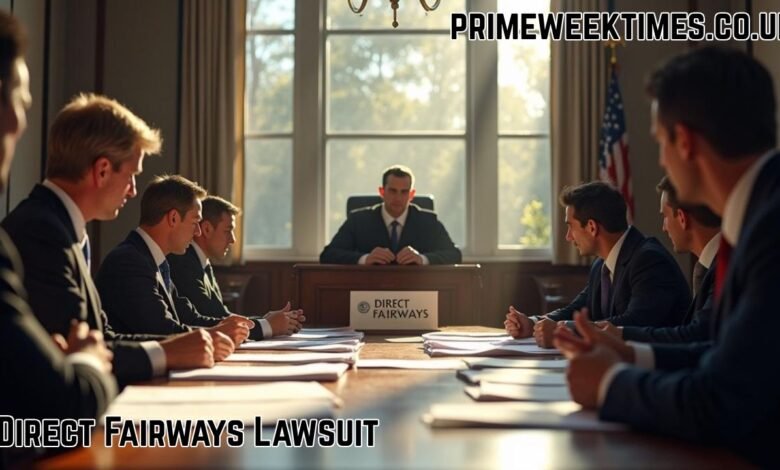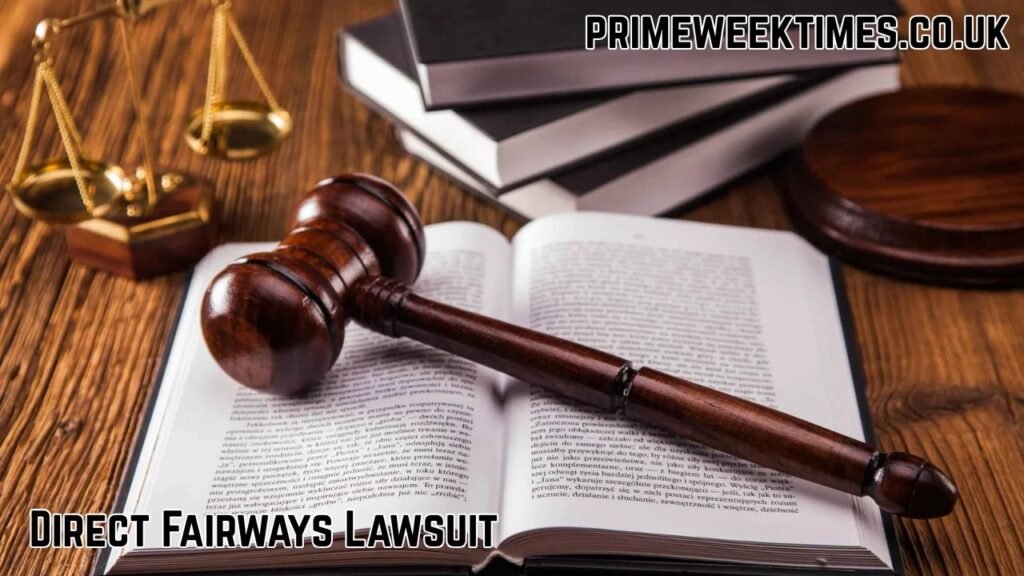Direct Fairways Lawsuit – Understanding the Case, Allegations, and Its Broader Impact

Introduction to the Direct Fairways Lawsuit
In recent years, legal disputes have become an increasingly common part of the business landscape, often shaping how companies are perceived by their clients and competitors. One such case that has caught the attention of professionals in the marketing and advertising sector is the Direct Fairways lawsuit. The case involves allegations, legal claims, and business practices that have stirred discussion about ethics, transparency, and corporate accountability within the golf marketing industry.
Direct Fairways, a company specializing in digital and print marketing for golf courses, has built a strong presence by offering promotional services to golf clubs across the United States. However, the Direct Fairways lawsuit has raised questions regarding the company’s sales tactics, client relations, and adherence to business regulations.
This article provides an in-depth look into the Direct Fairways lawsuit, exploring its background, the claims involved, and the lessons it presents for businesses and consumers alike.
Background of Direct Fairways
Before diving into the details of the Direct Fairways lawsuit, it’s important to understand the company’s background. Direct Fairways is a marketing and advertising firm that focuses on promoting golf courses and businesses related to the sport. Their services typically include brochure design, local advertising, and digital exposure for golf clubs and small businesses.
The company’s strategy involves connecting advertisers with golf facilities, producing marketing materials that feature sponsors, and distributing them to target audiences. For many years, Direct Fairways was recognized for its energetic sales force and wide-reaching network in the golf industry.
However, as the company grew, so did scrutiny over its business operations — eventually leading to the Direct Fairways lawsuit.
What Triggered the Direct Fairways Lawsuit?

The Direct Fairways lawsuit reportedly stems from disputes regarding the company’s sales and business practices. Allegations in the case suggest that some clients or former employees accused the company of misleading marketing claims, unfulfilled services, or aggressive sales tactics.
While legal filings vary by jurisdiction, common issues highlighted in such lawsuits often include:
- Misrepresentation of services or deliverables.
- Breach of contract or failure to perform agreed-upon services.
- Disputes over refund policies or billing practices.
- Workplace or employee-related grievances.
The Direct Fairways lawsuit brought these matters into public focus, prompting discussions about ethical marketing standards and consumer protection in niche industries like golf advertising.
The Nature of the Allegations
Although the specifics of the Direct Fairways lawsuit may differ depending on the parties involved, the core allegations generally focus on the company’s operational methods. Critics have claimed that the firm may have exaggerated the reach or effectiveness of its marketing materials or that certain sales representatives used high-pressure tactics to close deals.
In response, the company has reportedly defended its practices as standard within the advertising industry, emphasizing that client satisfaction remains a top priority. Like many businesses in competitive sectors, Direct Fairways has faced both satisfied and dissatisfied customers — a reality not uncommon in sales-driven organizations.
Still, the Direct Fairways lawsuit underscores the importance of clarity, honesty, and communication between businesses and clients, particularly in marketing partnerships that depend on trust.
Legal Proceedings and Developments
Legal disputes such as the Direct Fairways lawsuit can take months or even years to resolve. Proceedings typically involve discovery, mediation, and potential settlement discussions before a final judgment is reached.
If the Direct Fairways lawsuit includes multiple claims, each may be handled individually or consolidated depending on the court’s direction. In many cases, companies attempt to settle disputes privately to avoid reputational damage or extended litigation costs.
While details surrounding specific court actions may vary, the existence of the Direct Fairways lawsuit has already influenced public perception, drawing attention from industry observers and consumers who value transparency in marketing.
Impact on the Company’s Reputation
Reputation is one of the most valuable assets for any business, and the Direct Fairways lawsuit has undoubtedly affected how some view the company. Even if the allegations are disputed or unproven, public awareness of a lawsuit can impact trust and credibility.
For Direct Fairways, maintaining communication with clients and upholding ethical standards are crucial steps in rebuilding or sustaining reputation. The company’s response to the Direct Fairways lawsuit — through statements, actions, and improvements — will likely determine how the brand is perceived in the long term.
In the digital age, consumers increasingly research companies before doing business, and legal controversies can shape those decisions.
Lessons for Businesses and Entrepreneurs
The Direct Fairways lawsuit serves as an important reminder for companies across all industries: transparency and ethical operations are non-negotiable. Businesses must ensure that all marketing claims are accurate, contracts are clear, and customer expectations are managed effectively.
Key lessons that can be learned include:
- Prioritize transparency: Always ensure clients fully understand the scope of services and deliverables.
- Train ethical sales teams: High-pressure tactics can create short-term profits but long-term damage.
- Implement strong compliance: Legal and ethical compliance should be central to company culture.
- Monitor customer feedback: Addressing complaints early can prevent escalation into legal disputes.
The Direct Fairways lawsuit illustrates how even successful businesses can face challenges when communication and accountability are not prioritized.
Broader Industry Implications
The Direct Fairways lawsuit also shines a light on the broader golf and marketing industries. Many companies in niche markets operate with aggressive sales models and limited oversight. As a result, disputes between clients and service providers can escalate quickly.
This case could inspire tighter regulations or more transparency in business-to-business marketing sectors. It may also encourage golf courses and small businesses to conduct more thorough due diligence before entering contracts.
In the long run, the Direct Fairways lawsuit could influence industry standards by reinforcing the importance of customer trust, fair pricing, and verifiable performance metrics.
Perspectives from Clients and Industry Experts
Reactions to the Direct Fairways lawsuit have been mixed. Some clients report positive experiences, praising the company for delivering on its marketing promises and boosting exposure for their golf courses. Others have expressed frustration with billing or service issues, aligning with the themes raised in the lawsuit.
Industry experts suggest that while legal disputes are not uncommon, companies must adapt quickly to maintain trust. Transparency, accountability, and ongoing communication with clients are often the deciding factors between recovery and reputational damage.
The discussion surrounding the Direct Fairways lawsuit may ultimately encourage healthier business practices across the marketing industry as a whole.
How Direct Fairways Can Move Forward
While lawsuits present challenges, they can also serve as opportunities for reflection and improvement. For Direct Fairways, emerging stronger from this situation may involve several strategic actions:
- Public communication: Providing transparent updates on the company’s position or corrective measures.
- Internal audits: Reviewing sales scripts, contracts, and procedures to ensure compliance.
- Customer reconciliation: Re-engaging with clients to rebuild trust and clarify expectations.
- Ethical training: Reinforcing integrity-based practices across all departments.
If the company takes proactive steps, the Direct Fairways lawsuit could ultimately become a turning point that leads to a stronger, more transparent organization.
Legal and Ethical Considerations in Marketing

The Direct Fairways lawsuit brings up an important discussion about the line between persuasive marketing and misleading advertising. In industries built on relationship-based sales, representatives often push the limits of enthusiasm. However, crossing into misrepresentation can lead to legal trouble.
Marketing professionals must understand the legal frameworks that govern claims, consumer rights, and contractual obligations. The Direct Fairways lawsuit highlights that ethical behavior isn’t just good for reputation — it’s essential for long-term survival.
Public Perception and Media Attention
Media coverage and online discussions surrounding the Direct Fairways lawsuit have contributed to shaping public opinion. In an age where online reviews and forums carry significant weight, even unverified claims can spread quickly.
Companies facing lawsuits must respond strategically — acknowledging concerns without compromising legal standing. The way Direct Fairways communicates during and after this process will be critical to rebuilding consumer confidence.
Future Outlook for Direct Fairways
The ultimate outcome of the Direct Fairways lawsuit remains to be seen, but the company’s future will depend largely on its ability to adapt. If Direct Fairways can demonstrate commitment to integrity, strengthen client relationships, and resolve disputes transparently, it could recover its reputation and continue to operate successfully in the marketing world.
For clients and observers alike, the Direct Fairways lawsuit serves as a case study on how business practices, communication, and ethics intersect in modern commerce.
Conclusion – Lessons from the Direct Fairways Lawsuit
The Direct Fairways lawsuit represents more than just a legal case; it’s a reflection of the growing need for honesty and accountability in business. As industries evolve, companies must prioritize transparent practices, respect customer relationships, and adapt to legal and ethical expectations.
Whether or not the allegations are upheld, the discussion generated by the Direct Fairways lawsuit is valuable. It highlights the importance of strong ethical frameworks, clear communication, and continuous improvement — values that every organization can learn from.
For Direct Fairways, the road ahead offers both challenge and opportunity: the chance to prove that integrity and innovation can go hand in hand, even in the face of controversy.
Also Read: DOGE HHS Migrant Housing Contract – Understanding the Controversy, Policy, and Impact




